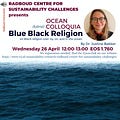Wednesday 26 April, 12-1pm CET
in-person: EOS N 1.760
on-line meeting: https://radbouduniversity.zoom.us/j/86556532378?pwd=Z2RncERIMjdLY1JaWFJWd1FaQlFSUT09
‘With This Root About My Person, a recently published collection of essays dedicated to the work of Charles Long—historian of religion and one of the most important and influential thinkers in Black religious studies—opens with a remarkable revelation. Had Long not become a scholar of religion, writes David Chidester, he would have dedicated himself to “mapping” the ocean. Suggesting a lasting interest in such an enterprise, Chidester goes on to show the extent to which Long’s work emphasized the significance of the ocean—a remarkable feat, given that Long did so years, even decades, prior to the emergence of the so-called “blue humanities.” Yet, like so many before and after him, Long’s interest in the ocean was predominantly as medium for transfer—of religious peoples, objects, and ideas. In this paper, I will use the moniker “blue Black religion” to consider other ways in which the ocean shows up in, and is important for, Black religion. Specifically, I will explore Black religion over, by, on, and in the ocean. My goal will not simply be to highlight the centrality of the ocean but to ask, too, how oceanic thinking may encourage or demand that we revisit some of the central themes and frameworks in the study of Black religion.’
Justine M. Bakker is Assistant Professor in Comparative Religious Studies at Radboud University Nijmegen. She works at the intersection of race and religion, focusing specifically on heterodox, esoteric, and alternative religion and conceptual and epistemological questions in the study of religion. She’s currently writing her first monograph, which is tentatively titled Demonic Ocean: Parareligion in the African Diaspora, and is co-editing a book on Sylvia Wynter and religion (with David Kline; under contract with Fordham University Press).



